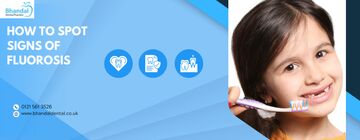
March 17, 2024
Fluoride For Kids & Cavities: The Myths & The Science [Parent’s Guide]
There are plenty of myths circulating about fluoride, its uses and how safe it is for children. When it comes to protecting your children, it makes sense that you would be concerned when you hear some of the concerns that some parents have about fluoride.
However, we hope that we can alleviate some of these concerns and provide you with the support you need to make the right choices for your family.
In this guide, we’ll explore the role of fluoride in oral health, why it’s so important for kids, and some of the myths that often circulate that could be wrongly planting seeds of doubt.
What is fluoride?
Fluoride is a natural mineral found in nature. It is essential for humans to help grow strong bones and teeth. We get it from our diet and absorb it through the gut. It is then stored in our bones.
It helps to give bones their strength and also helps to prevent tooth decay. It works by slowing down the process of demineralisation, so the outer surface of your teeth remains strong and protective.
There is a lot of controversy around fluoride because of rumours started about the substance being added to drinking water. Fluoride is found in almost all drinking water, but not at levels that would protect your teeth. This is why some places increase the concentration of fluoride in the drinking water.
Some places have rejected this practice, simply because they believe it should be down to choice. All other chemicals that are added to water and there to treat the water, but fluoride is not, it is a public health intervention. Some people believe that they should be given a choice about having fluoride in their water or not.
Having too much fluoride can be bad for your teeth and this can lead to a condition known as fluorosis. This leads to white spots on the teeth and can also weaken the bones.

Where is fluoride found?
Fluoride is added to drinking water in some places around the world, including the UK, USA, Ireland, Canada and Australia. It’s also added to toothpaste to help surface remineralisation. Fluoride also occurs naturally in brewed black tea and coffee, since the plants absorb the mineral from the soil.
Why do children need fluoride?
Fluoride is excellent for children as it helps to protect their teeth from decay. Children’s teeth are softer than adult teeth and don’t have the same hard mineral protection. It’s also possible that children might struggle to brush their teeth correctly. And finally, children are more likely to enjoy sweet and starchy treats that could contribute to tooth decay.
All of these factors mean that children are at higher risk of tooth decay and need all of the protection they can get. Getting your child to brush your teeth properly every day can be a struggle, so knowing that they are protected every time they drink water can be a huge source of relief for parents.
It’s also a good idea to check that your child’s toothpaste contains fluoride. Children should be brushing their teeth as soon as their first milk teeth emerge. You can find age-appropriate toothpaste with flavours like mild mint and strawberry to help encourage children to take care of their teeth.

Is fluoride safe?
Yes, fluoride is safe in moderation. Too much fluoride can be bad for health, and this is one reason that it’s important to supervise children when they brush their teeth. They should be encouraged to spit their toothpaste out and not swallow it, even if it is a tasty berry flavour.
The fluoride in your drinking water is regularly monitored to ensure it is present at safe levels. There have been reports of fluoride being linked to various health conditions, but there is no evidence to back up these concerns.
In fact, there is more evidence to suggest that fluoride is safe and good for your oral health, rather than potentially dangerous to your health.
To read more about recent studies exploring the safety and efficacy of fluoride in drinking water, explore these publications:
An evaluation of water fluoridation scheme in Cumbria – in 2021
Royal Society of New Zealand: Health effects of water fluoridation (PDF, 1Mb) – in 2014
Cochrane Oral Health Group: Water fluoridation for the prevention of dental caries – in 2015
These represent safety studies conducted across the world and all show a consensus that water fluoridation is safe.

How to spot signs of fluorosis
The only condition you need to be concerned about with fluoride is a condition known as fluorosis. This happens when an individual absorbs too much fluoride and this is commonly a result of high levels of fluoride in the drinking water.
Fluoride levels in UK drinking water are regularly monitored by the Drinking Water Inspectorate (DWI) and adjusted if necessary, so the risk is incredibly low. That said, it’s helpful to know the signs.
Fluorosis often presents as white or brown speckles on the teeth. It most commonly impacts children when they are developing their adult teeth. It’s a purely cosmetic concern and isn’t harmful.
Mild cases can often be corrected with teeth whitening when the child is older. For more severe cases, veneers or crowns might be recommended.
Final thoughts
We hope that this guide has helped to clear up some of the misconceptions you may have had around fluoride and its uses. As mentioned above, fluoride is present in UK drinking water at safe levels and this is regularly monitored. While overexposure can lead to a condition known as fluorosis, this is incredibly rare and not something you need to worry about.
Fluoride adds an additional line of defence against tooth decay and can help to safeguard your child’s teeth. Regular brushing with a fluoride toothpaste, drinking water and visiting the dentist for regular checkups are some simple ways your child can protect their adult teeth and limit the risk of tooth decay.
Join the practice
We offer excellent care and advice regarding our wide range of treatments to all of our patients.
Contact our main practice
0121 561 3526Find your nearest practice
Related articles
You may also be interested in
